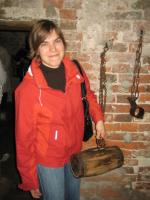Optimizing web search using web click-through data
CIKM '04: Proceedings of the thirteenth ACM international conference on Information and knowledge management, стр. 118--126. New York, NY, USA, ACM, (2004)DOI: 10.1145/1031171.1031192
Аннотация
The performance of web search engines may often deteriorate due to the diversity and noisy information contained within web pages. User click-through data can be used to introduce more accurate description (metadata) for web pages, and to improve the search performance. However, noise and incompleteness, sparseness, and the volatility of web pages and queries are three major challenges for research work on user click-through log mining. In this paper, we propose a novel iterative reinforced algorithm to utilize the user click-through data to improve search performance. The algorithm fully explores the interrelations between queries and web pages, and effectively finds "virtual queries" for web pages and overcomes the challenges discussed above. Experiment results on a large set of MSN click-through log data show a significant improvement on search performance over the naive query log mining algorithm as well as the baseline search engine.
Описание
Optimizing web search using web click-through data
Линки и ресурсы
тэги
сообщество
@jaeschke- тэги данного пользователя выделены






